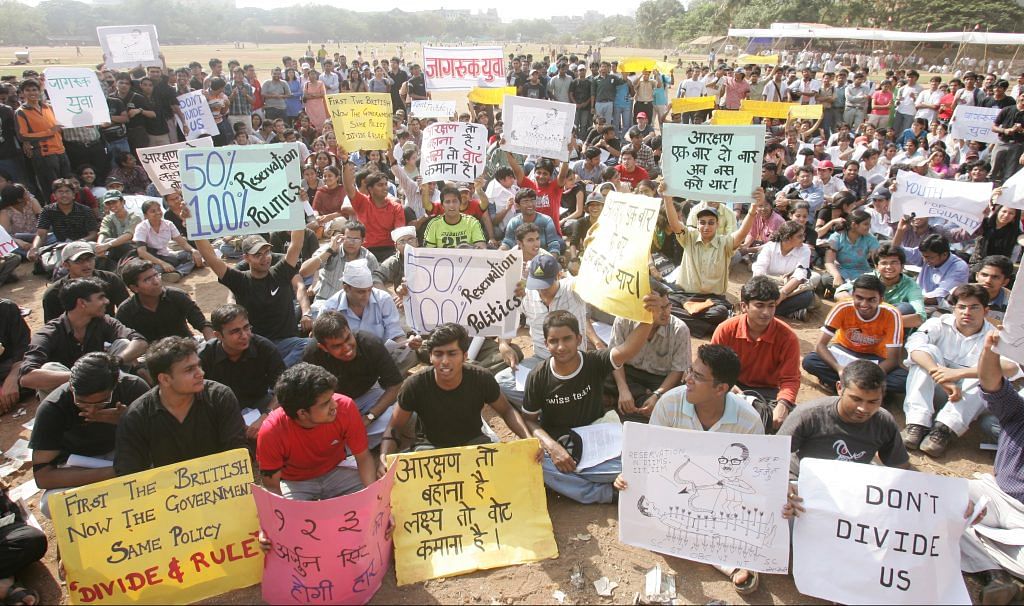As a Supreme Court constitutional bench looks into the reservation in promotion policy, here’s how three landmark judgments have dealt with the controversial issue.
New Delhi: Reservation, in entry-level jobs in the government sector as well as promotions, remains a controversial subject. There is general agreement that reservation for the weaker sections of society is required to uplift them, but it is the issue of whether employees who got their jobs under reserved quotas should be entitled to reservation in promotion that is causing a sharp division.
The matter has reached the Supreme Court several times, with the top court repeatedly pointing to the absence of any quantifiable data to allow such reservations.
Last year, the court had referred to a constitution bench the issue of interpretation of Articles 16(4), 16(4A) and 16(4B) of the Constitution of India by revisiting the settled law as per the cases of Indra Sawhney, Chinnaiah and Nagaraj.
The big issue that the constitution bench will look at is whether the test of backwardness should be applied to SCs and STs. It will also look at whether the creamy layer from among the weaker sections should be kept out of any kind of reservations.
Here’s how the three landmark judgments have dealt with the contentious issue of reservation:
Indra Sawhney and others versus Union of India and others (1992)
An 11-judge bench heard this case, which saw the parties hold forth on whether reservation in jobs was constitutional and if the government could provide for reservations in promotions. The court ruled that reservation in jobs under Article 16(4) of the Constitution dealt with initial appointments. It then went on to rule that reservations in promotions were unconstitutional.
The creamy layer among the backward classes, it said, must be eliminated from the backward classes lists. The court also said that though reservations shouldn’t exceed 50 per cent, the percentage could be changed on the basis of valid grounds backed by data.
After this judgment, the Parliament legislated the 77th constitutional amendment to negate the effect of this judgment.
E.V. Chinnaiah versus State of Andhra Pradesh (2005)
In this case, the five-judge bench dealt with the issue of whether some weaker sections are weaker than the others and can, thus, be granted more reservations. The apex court held that the legislature has no competence to decide on allowing reservations for sub-groups from among Scheduled Castes and Scheduled Tribes.
M. Nagaraj and others versus Union of India and others (2006)
This is the case that is the most-quoted in arguments about reservation — both inside and outside the courts. It was decided by a five-judge bench.
The bone of contention was Article 16(4A) that provided for reservation in promotions. The Supreme Court ruled that before providing for reservations the State will “have to show in each case the existence of the compelling reasons, namely, backwardness, inadequacy of representation and overall administrative efficiency.”
Holding that while there was no bar on a state to provide for “reservation for SC/ST in matter of promotions”, the same can be done only after the state has made out a case based on “quantifiable data showing backwardness of the class and inadequacy of representation of that class in public employment”.
Effect of the judgment
The states, though, have not collected the quantifiable data. Despite repeated setbacks in courts, especially in states like Uttar Pradesh, Andhra Pradesh etc, where absence of data resulted in the court striking down reservation in promotions as being unconstitutional, state governments continue to promise the same to lure voters from the weaker sections.
However, UPA-2 attorney general Goolam E. Vahanvati, in his opinion on whether a proposed amendment to the Constitution to deal with the issue of reservation in promotions, made it very clear that such an amendment may not be upheld by the courts. Unless the government took steps, before the amendment, to fulfill the criteria laid down in the Nagaraj case, Vahanvati added.
What happened to the amendment?
In 2012, the Congress-led UPA government introduced a bill in Parliament to amend the Constitution. The Constitution (One Hundred Seventeenth Amendment) Bill, 2012, was to make it clear that all SCs and STs notified in the constitutional amendment “shall be deemed to be backward”. Thus, the Centre proposed, that there was no actual need for a quantifiable data.
The bill was passed in Rajya Sabha but lapsed after the Lok Sabha completed its tenure. The Narendra Modi government is yet to take steps to revive the bill and get it passed.
